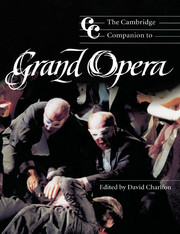Book contents
- Frontmatter
- 1 Introduction
- Part I The resourcing of grand opera
- Part II Revaluation and the twenty-first century
- Part III Grand operas for Paris
- Part IV Transformations of grand opera
- 16 Richard Wagner and the legacy of French grand opera
- 17 Grand opera in Russia: fragments of an unwritten history
- 18 Grand opera among the Czechs
- 19 Italian opera
- 20 Grand opera in Britain and the Americas
- Notes
- Select bibliography
- Index
20 - Grand opera in Britain and the Americas
from Part IV - Transformations of grand opera
Published online by Cambridge University Press: 28 November 2011
- Frontmatter
- 1 Introduction
- Part I The resourcing of grand opera
- Part II Revaluation and the twenty-first century
- Part III Grand operas for Paris
- Part IV Transformations of grand opera
- 16 Richard Wagner and the legacy of French grand opera
- 17 Grand opera in Russia: fragments of an unwritten history
- 18 Grand opera among the Czechs
- 19 Italian opera
- 20 Grand opera in Britain and the Americas
- Notes
- Select bibliography
- Index
Summary
Introduction
Britain and the Americas, lacking any significant and continuous native operatic traditions, depended upon foreign opera for much of the nineteenth century. Although Italian opera (and to a certain extent French opéra comique) often formed the basis of the repertory, German and serious French opera became increasingly popular in certain areas of Britain and the Americas in response to local circumstances: the nationality of immigrant populations, the tastes of a ruling élite, the experiences of local impresarios and the impact of political events.
In the 1830s the phenomenal popularity of grand opera – works such as Auber's La Muette de Portici (1828) and Gustave III (1833), Meyerbeer's Robert le Diable (1831) and Les Huguenots (1836), Halévy's La Juive (1835) – spread quickly throughout Europe and across the Channel. In London such works were translated into Italian or English and performed in a variety of faithful productions and pirate adaptations. From Europe they were exported to the East coast of America, often by English impresarios. Travelling troupes in America incorporated occasional grand operas into their still largely Italian repertories, and took them across the continent from where they entered Central and South America and were absorbed – to a lesser extent – into the repertories of local companies. Celebrated singers who had performed these operas in Paris brought to new audiences the roles for which they had become known.
- Type
- Chapter
- Information
- The Cambridge Companion to Grand Opera , pp. 403 - 422Publisher: Cambridge University PressPrint publication year: 2003
- 2
- Cited by

